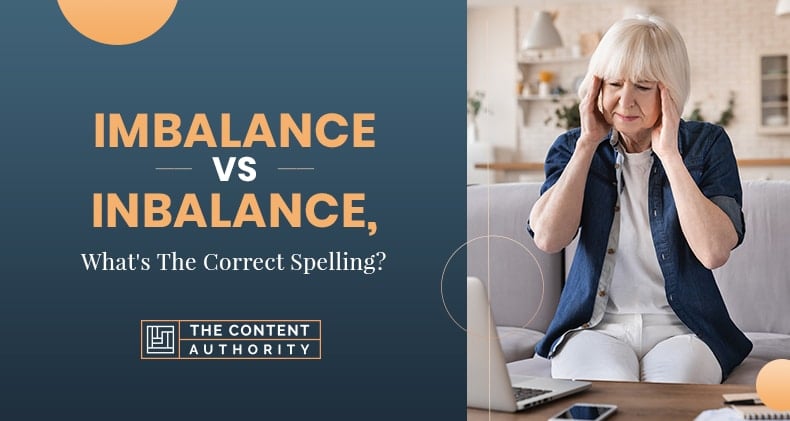Spelling words can be difficult because, as languages grow, we adopt more terms. Unfortunately, some of them are similar to existing ones, which causes misspellings or confusion when writing.
Imbalance refers to the absence of balance between two things that should or usually are equal. For example, when it comes to posture, it relates to not maintaining a vertical line from the mass center of the body while maintaining base support with minimal sway. Inbalance is a misspelled word and should not be used.
The term is related directly to the word “balance.” One means the absence of the other. In order to know more about the term in question, we have to analyze the root word. In this case, that word is “balance.”
What Is Balance?
There are different contexts in which the word “balance” is used, and depending on that, the definition changes.
Balance in biomechanics: Biomechanics studies the function, motion, and structure of the mechanical aspects of biological systems, regardless of their size or complexity. It is a division of biophysics. Balance, in this context, refers to maintaining a vertical line from a body’s center of mass to its base support that does not display a noticeable posture change. In other words, it is the stability produced by evenly distributing weight on each side of a vertical axis.
Balance in accounting: is the amount of money owed on an account.
Weighing scale: A balance or scale is a device used to measure mass or weight. These are also known as weight balances, weight scales, mass scales, mass balances.
What Is An Imbalance?
It is a lack of balance in a specific context. The effects of imbalance on humans can be numerous, and they can result in a variety of symptoms. For example, poor balance can cause us to feel dizzy and as though we’re spinning, even when we’re standing still. It can be unsettling and can interfere with your daily life. In addition, it can cause falls and injuries.
The Causes of balance problems are:
- Ear infections
- Inner ear problems
- Poor blood circulation
- Head injury
- Certain medications
- Low blood pressure
- High blood pressure
- Chemical imbalance in your brain
- Arthritis
- Neurological conditions
- Aging
Details:
- An inner ear infection can make us feel unsteady and dizzy
- Infections such as the flu or upper respiratory infections can contribute to this imbalance
- Dizziness caused by Vertigo happens when moving our heads rapidly. It usually occurs when we look up or behind us to do something
- A condition known as Meniere’s disease changes the volume of fluid in our ear, causing imbalance issues, ringing in our ears, and loss of hearing
- Ear infections, head injury, strenuous physical activity, and atmospheric pressure changes can cause leakage of the inner ear fluid to the middle ear
- Sea traveling can cause imbalance issues that can take hours, days, weeks, or months to clear up
- An acoustic neuroma tumor can also cause balance problems
Balance Training To Help With Imbalance Issues
Balance is an essential factor that predicts recovery and is required in many of our daily activities. It is often introduced into treatment programs by occupational therapists and physiotherapists. They recommend this treatment to patients with neurological conditions, the elderly, or others who may benefit from it. In stroke patients, balance training has been supported in the literature. Techniques usually used and proven to be helpful for these recovery patients cover standing or sitting balance exercises with different sequences. These include tilt boards, reaching, variations in the base of support, gait training at varying speeds, and stair climbing exercises.
Another method to correct the imbalance is perturbation training. This is an external force applied to a patient’s center of mass to move it from the base of support. The type of training for imbalance problems should be recommended by a professional such as a physiotherapist. It will depend on the severity and origin of the stroke, stage of recovery, and the abilities and impairments after the stroke.
Children, the elderly, as well as people with neuromuscular conditions and chronic ankle instability all, benefit from balance training. Improvements in postural sway and improved “one-legged stance balance” have been reported in these groups. Balance training is a powerful way to recover from imbalance issues acquired from different causes. Depending on the severity of the issue, the results will be more significant. It is best to always look for professional assistance to have proper treatment and achieve better results.
Origin Of The Term
There is not much information about the origins of imbalance, but the following can be found by searching “balance”:
As a noun, “balance” dates back to the 13th century. In those days, the term meant scales, apparatus for weighing by comparison of mass.
It reaches back to the 1570s as a verb, meaning to be equal with.
Imbalance is the lack of all those things I have said about “balance.” However, I’m sharing more definitions in order to avoid confusion.
More Definitions Of “Balance”
- A balance is a device that weighs things. It works with two plates on a bar. Each plate is on one side. Then it shows when both have the same weight by staying in the middle.
- It is the amount that remains of a given thing after all the rest has been used.
- It is the money that we have saved in a bank account.
- To be in balance refers to a position where we stand without falling to either side. It also applies to objects in this position.
- To give an equal amount of importance to many things.
- To achieve an equilibrium between spending and earning, the amount spent will not be higher than the earned amount.
More Definitions Of “Imbalance”
- It is the condition of lacking balance, as in distribution or proportion.
- Faulty glandular or muscular coordination.
- Lack of balance.
- The position of being out of proportion.
- Lack of balance in the force, proportion, functioning, etc.
Examples Of The Phrase In A Sentence
- One of the several benefits of acupuncture is the diagnosis to identify imbalances and treatment to restore the body’s harmony.
- If the water has an imbalance, that would reveal contamination.
- If power is imbalanced, then a war is inevitable.
- In products like wheat, the imbalance was less.
- Peter said that it was not caused by an imbalance in his diet. There were other factors.
- By now, the imbalance is an enormous 10 million shares.
- Experts in economics say that the imbalance in the economy is gathering force.
- It’s hard to see the imbalance if no one mentions anything.
- Nobody understands the imbalance between supply and demand and its importance.
- Over time, exportation would rise and reduce the trade imbalance.
- Sometimes I ask myself if this jacuzzi has a chemical imbalance.
- The office’s new rules do not correct regional imbalances.
- The significant imbalance won’t allow the enjoyment to last.
- The smaller companies typically make up for the imbalance with funds.
- The imbalance may get worse in the long run.
- No one is saying anything about the regional imbalances, and they have got to be discussed.
- You are definitely hiding something because there are some imbalances in that report.
- Trading upstate was stopped due to a system imbalance.
- Yet, we feel the imbalance more than ever before.
- There is a vast economic imbalance between the two regions.
Conclusion
Imbalance is a term that can mean several things. Still, the core of the meaning is the same: a lack of equality, lack of stability, and lack of equilibrium. It involves the center of mass of an object or an organism. Furthermore, in banking, instability is a lack of consistency in receiving and disbursing funds.
Inbalance does not exist. This is a word that sounds very similar to imbalance, but it is incorrect.
I’m going to check my income now to reduce imbalances in my finances. But first, I will stand up and stretch a little to improve my posture and avoid future imbalance issues. It would be best if you did both things too. As financial and physical well-being go hand in hand.
Shawn Manaher is the founder and CEO of The Content Authority. He’s one part content manager, one part writing ninja organizer, and two parts leader of top content creators. You don’t even want to know what he calls pancakes.



